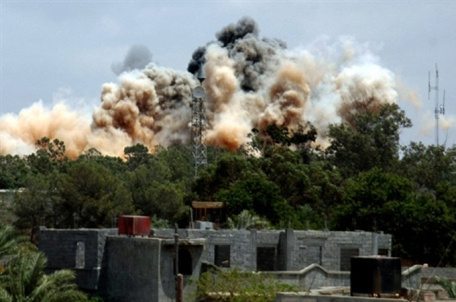The West Overlooks the Libyan Situation

JGB: The truth is that many believe that he will leave power. However, Gaddafi, his colleagues, supporters and the African Union have another view, and believe that Gaddafi should negotiate with his opponents and the result of these negotiations should be implemented.
In a meeting in Russia, in which both the Libyan and the international side were present, Gaddafi agreed to leave power. This is the first step. The next issue is that when a person leaves power he becomes a normal citizen. However, there are many questions about whether he will stay in the country or leave it, or be arrested.
Surely his opponents will not be satisfied unless Gaddafi is tried in at least a domestic court, because his hands are tainted with the blood of his people. In the international scene also, the sentence against Gaddafi and his sons has not been nullified.
But the issue is that there are many pillars still in the hands of Gaddafi, and one is the huge amount of money that he has saved. This may change the fate of Gaddafi compared to others like Milosevic in Serbia. Spending these funds to save Gaddafi’s life is a preplanned process. He has indicated in many negotiations with the West that he wants to stay in Libya and continue with his life in a territory given to him.
However, no international body or power knows what Gaddafi’s fate will be. Therefore, it seems that a fate like that of Saddam Hussein is awaiting Gaddafi as well. Saddam had also negotiated with the Americans that in return for his cooperation he wouldn’t be executed, but after the situation got complicated and Iraq was occupied, the plans of the opposition were carried out. Therefore we should wait and see who gets the upper hand in Libya. Currently all the forces are present on the scene and the transition council doesn’t have enough power to guarantee a certain outcome. Therefore, it is possible that Gaddafi’s fate turns out like that of Saddam as well.
But since Gaddafi is an unpredictable person and he might disclose some embarrassing revelations about the West, it is possible that after turning over his fortune the West might assassinate or execute him; even before Ben Ali or Mubarak’s trials take place. However, these kinds of predictions are all dependent on Gaddafi’s controversial statements against the West.
IRD: It is said that the military situation in Libya has reached a deadlock. Is it possible that after Gaddafi’s resignation, NATO reaches a political solution and the war comes to an end?
Actually this deadlock is a fake one. Gaddafi’s forces are very weak; they cannot stand against NATO or the West. In other words, if NATO wanted to seriously confront the Libyan army, it could have easily defeated it despite its organizational, information and budget deficits.
This seeming deadlock stems from two sources. First is the rivalry between Western governments who are in a dispute over providing the expenses of the war. At first, 50% of the expenses were met by the Europeans. Later, they only accepted to fund 30% and now less than 20% of the expenses. And the Americans are concerned that they have to pay the expenses themselves, which they are not ready to do so.
The other fact which influences this situation is the issue of sharing distribution in the future, and what percent of the Libyan oil and gas will go to which country.
As such, NATO’s operations become fast and slow based on the situation. Before the meeting in Russia we witnessed extensive NATO operations, before which no operation took place. Therefore the West only accelerates operations when it achieves some political or economic points. In addition to these reasons, there is the issue of arms sales as well. The West even used some scenes of the Libyan war in their weapon advertisements.
A deadlock is reached when a balance of power between both sides is reached. But in Libya there’s not even a political deadlock, and Gaddafi’s time had started to end a long time ago. It is the neglect of the West which is reflecting a situation of deadlock in Libya.
IRD: Considering the different position that France has taken in the case of Libya, and has provided the opposition with arms; do you think that it will attempt to persuade NATO land forces to enter Libya and end the war?
The possibility of the presence of NATO land forces is very low, especially when Russia is present in the Libyan negotiations. We saw that the West agreed to hold a meeting in Russia, while Russia was totally against NATO’s operation. Therefore the entrance of NATO land forces is impossible due to many reasons. First is that the West is concerned over getting into a military phase and having the situation in Iraq and Afghanistan at hand, which has created dissatisfaction among their people.
If Obama and Sarkozy agree to a NATO land operation, they have actually guaranteed their defeats in their next elections.
The benefit of air strikes is that the forces can go back to their bases after every operation and there is no target for the opposition to attack. There are many people among the Libyan revolutionaries who consider the West an enemy of the people of North Africa. Therefore a military risk for the presence of land forces in Libya is very high.

